外研版英语八年级上册M知识点
(word版)八年级上册英语外研版(新)各模块知识点归纳总结(全)文档,文档
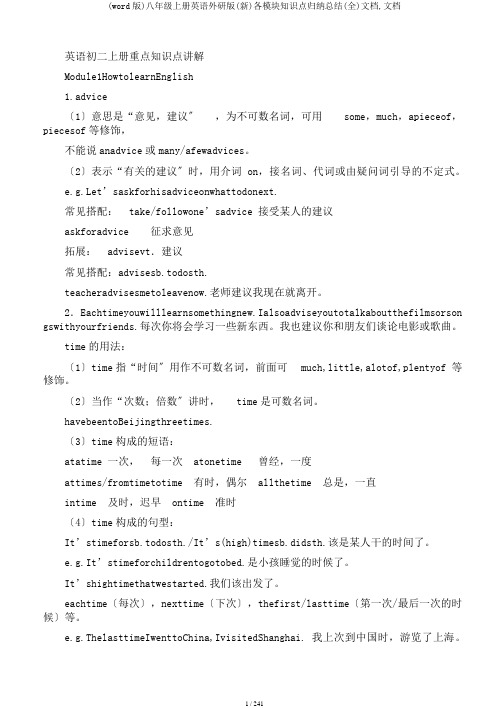
英语初二上册重点知识点讲解Module1HowtolearnEnglish1.advice〔1〕意思是“意见,建议〞,为不可数名词,可用some,much,apieceof,piecesof等修饰,不能说anadvice或many/afewadvices。
〔2〕表示“有关的建议〞时,用介词on,接名词、代词或由疑问词引导的不定式。
e.g.Let’saskforhisadviceonwhattodonext.常见搭配:take/followone’sadvice接受某人的建议askforadvice 征求意见拓展:advisevt.建议常见搭配:advisesb.todosth.teacheradvisesmetoleavenow.老师建议我现在就离开。
2.Eachtimeyouwilllearnsomethingnew.Ialsoadviseyoutotalkaboutthefilmsorson gswithyourfriends.每次你将会学习一些新东西。
我也建议你和朋友们谈论电影或歌曲。
time的用法:〔1〕time指“时间〞用作不可数名词,前面可much,little,alotof,plentyof 等修饰。
〔2〕当作“次数;倍数〞讲时,time是可数名词。
havebeentoBeijingthreetimes.〔3〕time构成的短语:atatime 一次,每一次atonetime 曾经,一度attimes/fromtimetotime 有时,偶尔allthetime 总是,一直intime 及时,迟早ontime 准时〔4〕time构成的句型:It’stimeforsb.todosth./It’s(high)timesb.did sth.该是某人干的时间了。
e.g.It’stimeforchildrentogotobed.是小孩睡觉的时候了。
It’shightimethatwestarted.我们该出发了。
外研八年级上module知识点复习精华版强烈推荐

外研八年级上m o d u l e知识点复习精华版强烈推荐(总8页)-CAL-FENGHAI.-(YICAI)-Company One1-CAL-本页仅作为文档封面,使用请直接删除Module 2 Friendship 复习要点一、词汇:见书后附录二、重点词组hold the line (= hold on) 稍等,别挂断。
call back 打(电话)回来right now 现在take a message 捎个信儿leave a message 留个信儿whether…or not 是否in fact 事实上a couple of…几个,若干in a week 一周后(用于将来时)miss one’s close friends 想念某人的好朋友be different from… (反义:the same as…) 与…不同 (反义:与…相同)make friends with sb. 与…交朋友good luck with…祝…好运bring sb. for a visit to some place 带某人来某地参观wait for sb. (to do sth.) 等待某人做某事invite sb. to do sth. / invite sb. to some place 邀请某人去做某事/去某地talk with/to sb about sth. 和某人谈论某事by the way 顺便说一下feel happy / unhappy / better 感觉快乐/不快乐/更好take place 发生far (away) from some place 离某地远be afraid to do sth. / be afraid of sth./doing sth. 害怕做某事every time + 时间状语从句每次want (sb.) to do sth. 想让某人做某事worry about…担心…sit at the desk / work at the computer 坐在桌旁/在电脑前工作as usual 像往常一样at that moment 在那时enter the room (注意enter是及物动词,后不加介词。
外研版初中八年级上册M3知识点(默写版)
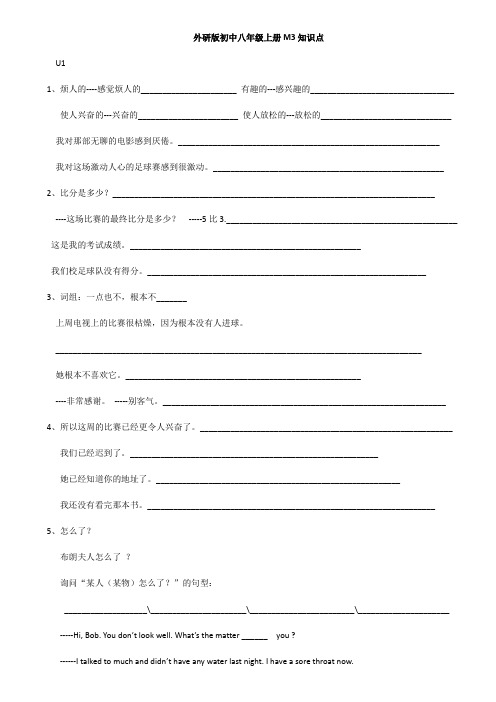
外研版初中八年级上册M3知识点U11、烦人的----感觉烦人的______________________ 有趣的---感兴趣的_________________________________使人兴奋的---兴奋的_______________________ 使人放松的---放松的______________________________ 我对那部无聊的电影感到厌倦。
____________________________________________________________我对这场激动人心的足球赛感到很激动。
_____________________________________________________ 2、比分是多少?__________________________________________________________________________----这场比赛的最终比分是多少?-----5比3._____________________________________________________这是我的考试成绩。
_____________________________________________________我们校足球队没有得分。
________________________________________________________________3、词组:一点也不,根本不_______上周电视上的比赛很枯燥,因为根本没有人进球。
____________________________________________________________________________________她根本不喜欢它。
______________________________________________________----非常感谢。
英语8上外研版全册综合:m1—6 单元总结
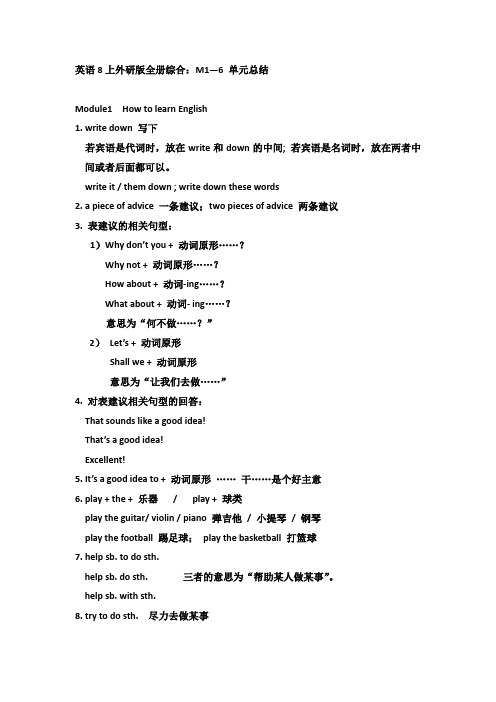
英语8上外研版全册综合:M1—6 单元总结Module1 How to learn English1. write down 写下若宾语是代词时,放在write和down的中间; 若宾语是名词时,放在两者中间或者后面都可以。
write it / them down ; write down these words2. a piece of advice 一条建议;two pieces of advice 两条建议3. 表建议的相关句型:1)Why don’t you + 动词原形……?Why not + 动词原形……?How about + 动词-ing……?What about + 动词- ing……?意思为“何不做……?”2)Let’s + 动词原形Shall we + 动词原形意思为“让我们去做……”4. 对表建议相关句型的回答:That sounds like a good idea!That’s a good idea!Excellent!5. It’s a good idea to + 动词原形……干……是个好主意6. play + the + 乐器/ play + 球类play the guitar/ violin / piano 弹吉他/ 小提琴/ 钢琴play the football 踢足球;play the basketball 打篮球7. help sb. to do sth.help sb. do sth. 三者的意思为“帮助某人做某事”。
help sb. with sth.8. try to do sth. 尽力去做某事try not to do sth. 尽力不去做某事try doing sth. 尝试去做某事8. ask for 寻求9. enjoy doing sth. 喜欢做某事10. It takes sb. some time to do sth.花费某人多长时间做某事Eg: It takes her one hour to do his homework every day.她每天花费1小时来做她的家庭作业。
外研版英语八年级上册所有知识点总结

Module2——重点句型
• 一、表达位置的三个介词 • in 在……之内,表示一个小 地方位于大地方范围内 • on 在……边,表示一个地方 在另一个地方的某一边,两 个地方接壤 • to 在……面,表示一个地方在 另一个地方的范围之外 • 二、表达人口的句子 • 1.What’s the population of Danfeng?= How large is the population of Danfeng? • 2.The population of Danfeng is about 310,000. = Danfeng has a population of about 310,000.
• 9. at the same time 同时 • 10. offer to do sth 主动提出做某事 • 11. hope to do sth 希望做某事 • 12. wish sb to do sth 希望某人做某事 • 13. buy sb sth = buy sth for sb 为某人购买某物
Module 5 重点词组
• 1. how long 多久 • 2. in the end 最后,终于 • 3. from…to… 从…到… • 4. give a warm welcome to sb 热烈欢迎某人 • 5. all over the world 全世界 • 6. take place 发生,举行 • 7. decide to do sth 决定做某事 • 8. have a great time 玩的愉快
Module Байду номын сангаас 重点句型
• 1.不定式作宾语的句子: • ① I wanted to see the Beijing Opera, so lingling offered to take me there . • 2. one of 的用法: • Mary is one of my best friends. • 3. if 引导的条件状语(主将从现) • If you like the weather, you can go to the park. • If it doesn’t rain, We will go to Tian’anmen Square.
八上英语m2的知识梳理外研版
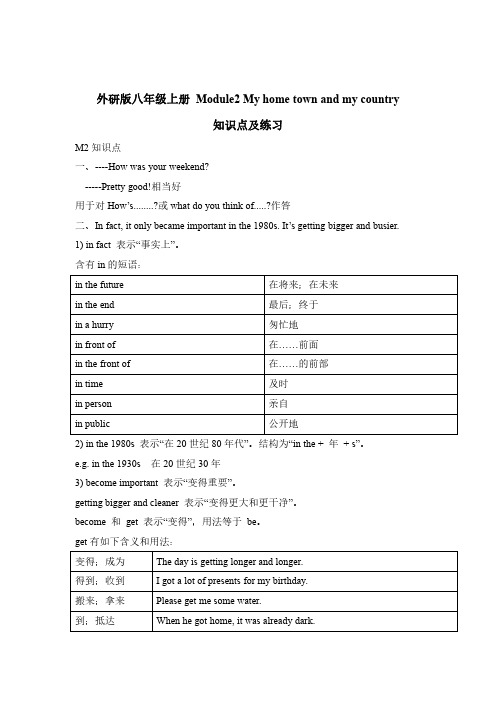
外研版八年级上册Module2My home town and my country知识点及练习M2知识点一、----How was your weekend?-----Pretty good!相当好用于对How’s........?或what do you think of.....?作答二、In fact,it only became important in the1980s.It’s getting bigger and busier.1)in fact表示“事实上”。
含有in的短语:in the future在将来;在未来in the end最后;终于in a hurry匆忙地in front of在……前面in the front of在……的前部in time及时in person亲自in public公开地2)in the1980s表示“在20世纪80年代”。
结构为“in the+年+s”。
e.g.in the1930s在20世纪30年3)become important表示“变得重要”。
getting bigger and cleaner表示“变得更大和更干净”。
become和get表示“变得”,用法等于be。
get有如下含义和用法:变得;成为The day is getting longer and longer.得到;收到I got a lot of presents for my birthday.搬来;拿来Please get me some water.到;抵达When he got home,it was already dark.三、It’s on the coast near Hong Kong.在海岸线上四、Some day it will become as busy as Hong Kong.有一天它会变得跟香港一样繁忙1)as+形容词/副词+as和……一样e.g.He is as tall as his brother.他和他的哥哥一样高。
外研版八年级英语上册知识点汇总
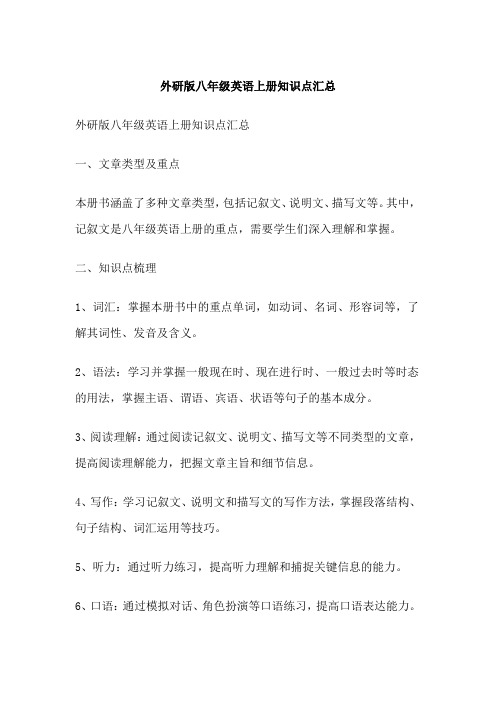
外研版八年级英语上册知识点汇总外研版八年级英语上册知识点汇总一、文章类型及重点本册书涵盖了多种文章类型,包括记叙文、说明文、描写文等。
其中,记叙文是八年级英语上册的重点,需要学生们深入理解和掌握。
二、知识点梳理1、词汇:掌握本册书中的重点单词,如动词、名词、形容词等,了解其词性、发音及含义。
2、语法:学习并掌握一般现在时、现在进行时、一般过去时等时态的用法,掌握主语、谓语、宾语、状语等句子的基本成分。
3、阅读理解:通过阅读记叙文、说明文、描写文等不同类型的文章,提高阅读理解能力,把握文章主旨和细节信息。
4、写作:学习记叙文、说明文和描写文的写作方法,掌握段落结构、句子结构、词汇运用等技巧。
5、听力:通过听力练习,提高听力理解和捕捉关键信息的能力。
6、口语:通过模拟对话、角色扮演等口语练习,提高口语表达能力。
三、知识点延伸1、动词时态:通过实例对比一般现在时和现在进行时的区别,了解不同时态的表达方式和运用场景。
2、状语从句:掌握时间状语从句、条件状语从句等不同类型的状语从句,了解其在句子中的作用和用法。
3、现在完成时:学习现在完成时的基本用法,掌握已完成动作对现在的影响。
4、主谓一致:理解主谓一致的概念,掌握不同类型的主语与谓语动词的搭配规则。
四、文章结构分析1、开头段:简述文章主题,引起读者兴趣。
2、主体段:详细阐述文章的主要内容,包括背景、原因、过程和结果等。
3、结尾段:总结全文,强调主题,提出结论或展望未来。
五、检查与修改1、语法检查:检查文章中的语法错误,包括错别词、不正确的句子结构等。
2、拼写检查:核实文章中的拼写是否正确,避免因拼写错误导致的意思混淆。
3、标点符号检查:确保标点符号的运用符合英语语法规则,避免因标点错误引起的语义误解。
六、写作技巧1、段落结构:确保每个段落具有明确的主题,并且段落结构清晰,避免段落内容混淆或重复。
2、句子结构:熟练掌握英语句子结构,尤其要注意句子之间的逻辑联系和连贯性。
外研社英语八年级上M1_M3知识点整理

外研社英语八年级上M1_M3知识点整理外研社英语八年级上模块知识点Module1 How to learn English Unit1 Let’s try to speak English as much as possible.1.Welcome back!Welcome back to school!Welcome to China/our school/my home town!Welcome home!You’re welcome.give sb. a cold/warm welcome注意welcome的词性v. adj n.2.talk with/to sb. about sth.have a talk/conversation with sb.3. ask for some advicea piece of advice注意advice是不可数名词,不能说these advicegive sb. advice给某人建议take/follow one’s advice听从某人的建议4. speak English in classspeak English as much as possible read books as many as you can as…as possible = as…as one can/could 5. write down our mistakes in our notebookswrite it/them down (代词宾格只能放中间)类似结构还有pick up, take off, put on, turn on, turn off, turn down, turn up 6. forget/ remember to do sth.记得、忘记要做某事(还没做)forget/remember doing sth. 记得、忘记做过某事(已经做了)eg: Don’t forget to bring your photos here when you come.I remember seeing him somewhere in Jiaxing. 我记得在嘉兴的某个地方见过他。
(完整版)八年级的上册的英语外研版(新)各模块知识点归纳总结(全)_文档.docx

英语初二上册重点知识点讲解Module 1 How to learn English1. advice( 1)意思是“意,建”,不可数名,可用some, much, a piece of, pieces of 等修,不能 an advice 或 many/a few advices 。
( 2)表示“有关⋯⋯的建” ,用介on,接名、代或由疑引的不定式。
e.g. Let’ s ask for his advice on what to do next.常搭配:take/follow one ’s advice接受某人的建ask for advice征求意拓展:advise vt.建常搭配: advise sb. to do sth.e.g.My teacher advises me to leave now.老建我在就离开。
2. Each time you will learn something new. I also advise you to talk about the films or songs with your friends. 每次你将会学一些新西。
我也建你和朋友影或歌曲。
time 的用法:( 1) time 指“ ”用作不可数名,前面可much, little, a lot of, plenty of等修。
( 2)当作“次数;倍数” ,time 是可数名。
e.g.I have been to Beijing three times.( 3) time 构成的短:at a time一次,每一次at one time曾,一度at times /from time to time有,偶all the time是,一直in time及,早on time准( 4) time 构成的句型:①It ’s time for sb. to do sth./It ’ s (high) time sb. did sth. 是某人干⋯⋯的了。
外研版八年级上册M2知识点总结
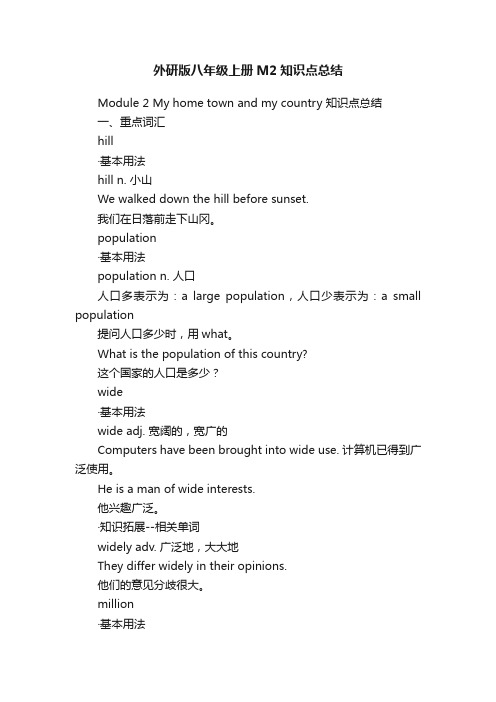
外研版八年级上册M2知识点总结Module 2 My home town and my country 知识点总结一、重点词汇hill·基本用法hill n. 小山We walked down the hill before sunset.我们在日落前走下山冈。
population·基本用法population n. 人口人口多表示为:a large population,人口少表示为:a small population提问人口多少时,用what。
What is the population of this country?这个国家的人口是多少?wide·基本用法wide adj. 宽阔的,宽广的Computers have been brought into wide use. 计算机已得到广泛使用。
He is a man of wide interests.他兴趣广泛。
·知识拓展--相关单词widely adv. 广泛地,大大地They differ widely in their opinions.他们的意见分歧很大。
million·基本用法million num. 百万如果表示具体的数字,用基数词+million (million不能加s)millions of 表示:数百万的The country has a population of 100 million.这个国家有一亿人口。
There were millions of people in the square.广场上有好多好多人。
·知识拓展--相关单词类似million的词还有:hundred 百 thousand 千 billion 十亿pretty·原文再现Pretty good!很好!·基本用法1. pretty adv. 相当地;很;非常,常用于口语中。
八年级(上册)英语外研版各模块知识点汇总
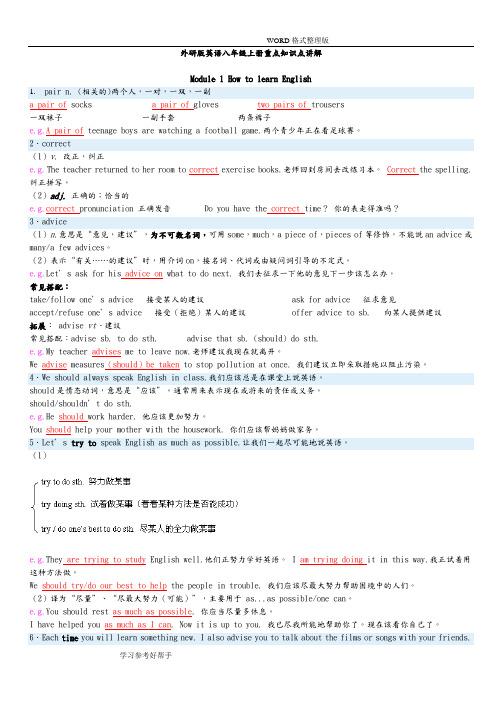
外研版英语八年级上册重点知识点讲解Module 1 How to learn English1.pair n. (相关的)两个人,一对,一双,一副a pair of socks a pair of gloves two pairs of trousers一双袜子一副手套两条裤子(1)改正,纠正e.g. T he teacher returned to her room to correct exercise books.老师回到房间去改练习本。
Correct the spelling.纠正拼写。
(2)adj.正确的;恰当的(1)意思是“意见,建议”,为不可数名词,可用some,much,a piece of,pieces of等修饰,不能说an advice或many/a few advices。
(2)表示“有关……的建议”时,用介词on,接名词、代词或由疑问词引导的不定式。
e.g.Let’s ask for his advice on what to do next. 我们去征求一下他的意见下一步该怎么办。
常见搭配:take/follow one’s advice接受某人的建议ask for advice 征求意见accept/refuse one’s advice接受(拒绝)某人的建议offer advice to sb. 向某人提供建议拓展: advise vt.建议常见搭配:advise sb. to do sth. advise that sb. (should) do sth.e.g.My teacher advises me to leave now.老师建议我现在就离开。
should是情态动词,意思是“应该”。
通常用来表示现在或将来的责任或义务。
should/shouldn’t do sth.e.g.He should work harder. 他应该更加努力。
(1)e.g.They are trying to study English well.他们正努力学好英语。
外研社英语八上M2知识点归纳

Unit1基础知识归纳1.high(形容词)意为高的,多用来形容山、墙或飞机的飞机的飞行高度等,其名词为height,意为高度。
辨析:high与tall(1)指人、动物、树木等,主要用tall,不用high.a tall woman a tall horse(2)指一个不与地面接触的人或物的高时,要用high,不用tall,比如站在桌子上,天空在天空上飞。
The plane is so high in the sky.(3)指建筑物或山高时,tall与high都可以,不过high的程度比tall 高(4)High可作副词,tall不能(5)tall的反义词为short,high的反义词是lowlion为数词,意为百万(1)million前有具体数字,表达具体的数目时,million用单数形式。
即:数词+million+名词复数。
five million dollars五百万美元(2)表达非具体数目时,用million,billion等的复数+of。
如:millions of people数百万人。
拓展:hundred(百),thousand(千),billion(十亿)的用法与million相同。
3.So it’s a newer city than Hong Kong?所以它是一个比香港还新的城市吗?than译为:比。
是比较级的标志词,它前面的形容词、副词要用比较级。
4.In fact, it only became important in the 1980s.事实上,它只有在20世纪80年代才变得很重要。
in the 1980s表示20世纪80年代。
in the early 1980s在20世纪80年代早期,in the late 1980s在20世纪80年代晚期5.What’s the population of Shenzhen?深圳的人口是多少?(1)population是集合名词,没有复数形式。
八年级上册英语外研版(新)各模块知识点归纳总结(全)_文档

英语初二上册重点知识点讲解Module1How to learn English1.pair n.(相关的)两个人,一对,一双,一副a pair of socks a pair of gloves two pairs of trousers一双袜子一副手套两条裤子e.g.A pair of teenage boys are watching a football game.两个青少年正在看足球赛。
2.correct(1)v.改正,纠正e.g.The teacher returned to her room to correct exercise books.老师回到房间去改练习本。
Correct the spelling.纠正拼写。
(2)adj.正确的;恰当的e.g.correct pronunciation正确发音Do you have the correct time?你的表走得准吗?3.advice(1)n.意思是“意见,建议”,为不可数名词,可用some,much,a piece of,pieces of等修饰,不能说an advice或many/a few advices。
(2)表示“有关……的建议”时,用介词on,接名词、代词或由疑问词引导的不定式。
e.g.Let’s ask for his advice on what to do next.我们去征求一下他的意见下一步该怎么办。
常见搭配:take/follow one’s advice接受某人的建议ask for advice征求意见accept/refuse one’s advice接受(拒绝)某人的建议offer advice to sb.向某人提供建议拓展:advise vt.建议常见搭配:advise sb.to do sth.advise that sb.(should)do sth.e.g.My teacher advises me to leave now.老师建议我现在就离开。
(完整版)外研社八年级英语上册Module2知识点总结归纳

M2My home town and my countryUnit 11. population “(某一地区的)人口;全体居民”,它是一个集体名词。
有特殊用法,容易出错。
①形容人口的“多”或“少”,要用“large、big”或“small”,不用much或littleIndia has a large population. Singapore has a small population.②表示“某地有多少人口”的句型:The population of +某地+is(was)+数字,该句型中的population前要用定冠词the,作主语时,谓语动词常用第三人称单数形式。
(be动词用is;实义动词加s或es)某地+has a population of +数字The population of China is more than 1.3 billion.中国有大于十三亿人口= China has a population of more than 1.3 billion.③询问某国某地有多少人口时,要用How large...?或What...?How large is the population of ......?= What is the population of ......?How large is the population of Hong Kong?=What’s the population of Hong Kong?is the population of that country? About 17 million.A. How manyB. HowC. WhatD. How much④当主语是表示“人口的百分之几、几分之几”时,谓语动词用复数形式。
About seventy percent of the population in China are farmers.2.wide 宽的Wide adj 宽的;宽阔的;广泛的,做表语或者定语Widely adv 宽阔地;广泛地lion 百万①数字+million ,表示确切数目,million要用单数,后不加s,而且不接介词ofThere are about two milion people in the city.②millions + of ,数百万,表示不确切的数目,million要用复数,后加s,而且后接介词ofMillions of people all over the world come to visit the town.③后面的名词有了the, these, those等特指限定词修饰时,或其后的接的是us, them 这样的人称代词时,则此时必须用介词of。
八年级上册英语外研版m1知识点

八年级上册英语外研版m1知识点作为英语学习的基础知识,八年级上册英语外研版M1的知识点涵盖了词汇、语法和阅读等方面,这些知识点对于学习英语和备战考试都有着至关重要的作用。
本文将从几个方面详细介绍这些知识点。
一、词汇词汇是语言的基础,熟练掌握词汇对于学习英语至关重要。
八年级上册英语外研版M1的词汇知识点包括:1. 动词短语:例如“look after”、“take out”、“put on”等常见动词短语,需要掌握它们的意思和在句子中的使用方法。
2. 副词和形容词:例如“beautiful”、“comfortable”、“carefully”、“quickly”等形容词和副词,需要掌握它们的意思和正确的用法。
3. 名词:例如“book”、“table”、“teacher”等名词,需要掌握它们的意思和复数形式。
二、语法语法是英语中最为重要的知识点之一,学习语法可以帮助学生更加准确地表达自己的意思。
八年级上册英语外研版M1的语法知识点包括:1. 时态:学习英语的时态是英语语法的基础,需要掌握常见的时态,如现在时、过去时、将来时等,并且学会在实际应用中正确运用。
2. 被动语态:被动语态在英语中使用广泛,需要掌握被动语态的构成和使用方法。
3. 代词:代词在英语中的使用频繁,需要掌握代词的种类和正确的使用方法。
三、阅读阅读是提高英语水平的关键之一,通过阅读可以积累大量的词汇和语法知识,同时也可以提高阅读理解能力。
八年级上册英语外研版M1的阅读知识点包括:1. 阅读理解:阅读理解是考试中必不可少的一部分,需要掌握阅读理解的技巧和方法。
2. 阅读技巧:阅读技巧是提高阅读能力的关键,需要掌握一些阅读技巧,如快速阅读、略读和详读等。
3. 词汇积累:通过阅读可以积累大量的词汇,需要在阅读过程中注重词汇积累,并且学会如何运用这些词汇。
四、总结以上就是八年级上册英语外研版M1的知识点介绍。
掌握这些知识点需要学生不断地进行练习和积累,通过不断地学习和复习,才能够真正地掌握这些知识点,并在实际应用中灵活地使用。
八年级(上册)英语外研版各模块知识点汇总
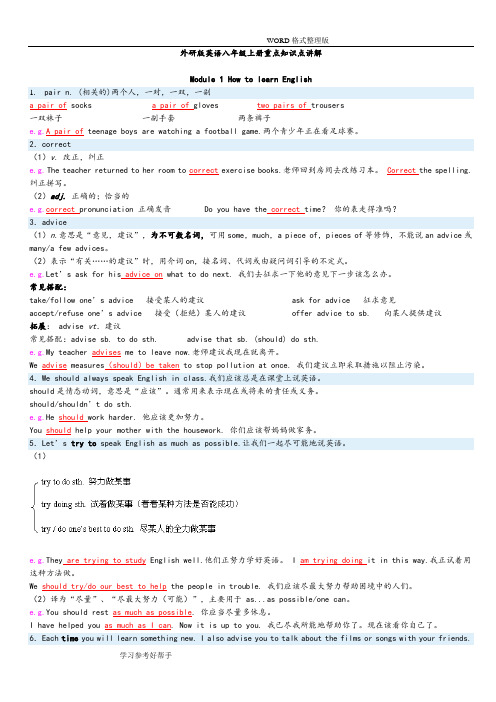
外研版英语八年级上册重点知识点讲解Module 1 How to learn English1.pair n. (相关的)两个人,一对,一双,一副a pair of socks a pair of gloves two pairs of trousers一双袜子一副手套两条裤子(1)改正,纠正e.g. T he teacher returned to her room to correct exercise books.老师回到房间去改练习本。
Correct the spelling.纠正拼写。
(2)adj.正确的;恰当的(1)意思是“意见,建议”,为不可数名词,可用some,much,a piece of,pieces of等修饰,不能说an advice或many/a few advices。
(2)表示“有关……的建议”时,用介词on,接名词、代词或由疑问词引导的不定式。
e.g.Let’s ask for his advice on what to do next. 我们去征求一下他的意见下一步该怎么办。
常见搭配:take/follow one’s advice接受某人的建议ask for advice 征求意见accept/refuse one’s advice接受(拒绝)某人的建议offer advice to sb. 向某人提供建议拓展: advise vt.建议常见搭配:advise sb. to do sth. advise that sb. (should) do sth.e.g.My teacher advises me to leave now.老师建议我现在就离开。
should是情态动词,意思是“应该”。
通常用来表示现在或将来的责任或义务。
should/shouldn’t do sth.e.g.He should work harder. 他应该更加努力。
(1)e.g.They are trying to study English well.他们正努力学好英语。
外研版英语八年级上册M知识点
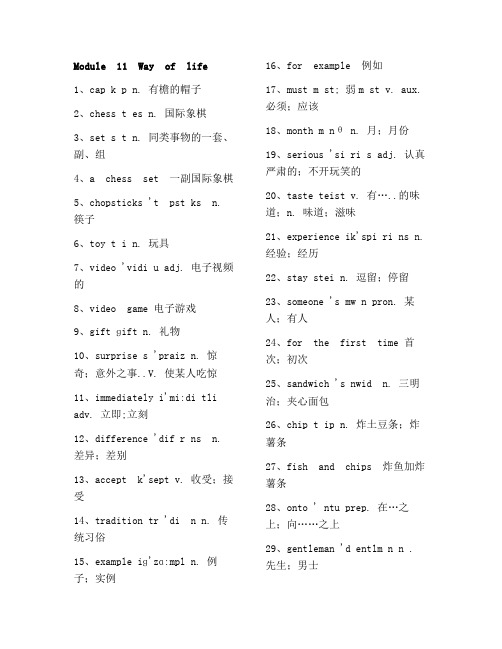
Module 11 Way of life1、cap k p n. 有檐的帽子2、chess t es n. 国际象棋3、set s t n. 同类事物的一套、副、组4、a chess set 一副国际象棋5、chopsticks 't pst ks n. 筷子6、toy t i n. 玩具7、video 'vidi u adj. 电子视频的8、video game 电子游戏9、gift ɡift n. 礼物10、surprise s 'praiz n. 惊奇;意外之事..V. 使某人吃惊11、immediately i'mi:di tli adv. 立即;立刻12、difference 'dif r ns n. 差异;差别13、accept k'sept v. 收受;接受14、tradition tr 'di n n. 传统习俗15、example iɡ'zɑ:mpl n. 例子;实例16、for example 例如17、must m st; 弱m st v. aux. 必须;应该18、month m nθ n. 月;月份19、serious 'si ri s adj. 认真严肃的;不开玩笑的20、taste teist v. 有…..的味道;n. 味道;滋味21、experience ik'spi ri ns n. 经验;经历22、stay stei n. 逗留;停留23、someone 's mw n pron. 某人;有人24、for the first time 首次;初次25、sandwich 's nwid n. 三明治;夹心面包26、chip t ip n. 炸土豆条;炸薯条27、fish and chips 炸鱼加炸薯条28、onto ' ntu prep. 在…之上;向……之上29、gentleman 'd entlm n n . 先生;男士30、shoulder ' uld n. 肩;肩膀一、重点短语:1. a chess set 一副国际象棋2. video game 电子游戏3. do some cleaning 打扫卫生4. bad luck 倒霉5. the Spring Festival 春节6. get married 结婚7. for example例如8. for the first time 首次;初次9. shake hands握手10. have afternoon tea喝下午茶11. light meal便餐;便饭12. be different from与……不同13. each other互相14. on time准时;按时 in time 及时; 适时15. look up查寻 look forwardto/ to doing sth 期待;盼望16. at the age of在……岁时17. clean up打扫干净18. wash up洗刷;饭后洗餐具19. stay out待在户外;不回家20. can't wait to迫不及待21. make mistakes犯错;出错二、重点句型:1. Here is your gift. 这是你的礼物这是一句由here引导的倒装句;即here+谓语+主语;此外there也有这样的用法..Eg:There comes the bus.注意:只有当主语是普通名词时才能够用倒装句;如果是代词则不能..Eg:Here you are.2. What a surprise 真惊讶啊to one’s surprise 令sb惊奇的是此句是感叹句;用来表达赞美、惊叹、喜悦等感情;同样用how也可引导感叹句..what +a\an+adj.+n.+主语+谓语 Eg:What a beautiful girl she ishow +adj.\adv. +主语+谓语 Eg:How beautiful the girl is3. You needn’t wait. 你不必等了..need在这里用作情态动词;表示“需要”;常用于否定句、疑问句;也用于must引导的一般疑问句的否定回答needn’t;其后用动词原形..needn’t = don’t have to 不必做Eg:You needn’t come to school this afternoon.---Must I finish my homework today ---No; you needn’t.need作实义动词时;表示需要做某事..当句子主语是人时;用need to do sth 某人需要做某事Eg:I need to take some exercise every morning.当句子主语是物时;用need doing sth 某物需要被…. 这里;主动表被动;特殊用法Eg:Our classroom needs cleaning everyday.4. differencen. 不同之处;区别→differentadj.不同的be different from A is defferent from B. A 与B不同5. pay attention to doing sth 注意做某事; 重视做某事;关心;留意6. accept 主观意识接受 receive 客观意识收到;得到Eg:She received a present; but she didn’t accept it.7. do some cleaning 打扫卫生这是一个由do+some+doing构成的短语Eg:You should help your mother do some cleaning after school. do some washing\cooking\shopping\sewing8. had better not do sth 最好不做sthEg:We had better take an umbrella.Eg: You’d better not go out in the evening.9. experiencen. 经历可数名词 ;经验、体验不可数名词10. enjoy doing sth 喜欢做某事Eg:Mike enjoys watching football matches.enjoy oneself=have a good\nice time 玩的高兴;过的愉快11. something interesting 有趣的事当adj.碰到不定代词时;应把adj.放在后面 something + adj.Eg: Can you tell something different between the two picturesEg. Something delicious12. get to know 了解;认识Eg:Do you get to know my friend Bill13. not……but……不是……而是……but表示转折Eg:She wants to buy not a skirt; but a dress.not only……but also……不但……而且……表示递进Eg:He can speak not Chinese but also English.14. traditionaladj. 传统的→ traditionn. 传统15. take away 拿走; 带走代词只能放在中间;名词放中间和后面均可Eg: take it away = take the pen away = take away the pen16. 1stop v. 停止stop to do sth 停下来去做某事 Eg. You should stop to do your homeworkstop doing sth 停下来正在做的事情 Eg. You should stop shouting at classroom.2stop n. 停止;车站bus stop 停靠站17. 1turn v. 转弯;变得turn left turn green2turn n. 顺序Eg. It is your turn.18. at a age of =when sb is……years old. 在……岁时19. 1 stay out 不回家;待在外面Eg:Yesterday he stayed out after 12 o’clock.2 stay at home 呆在家里Eg. It’s rainy day; let’s stay at home.3 stay up 熬夜Eg. We’d better not stay up; it is bad for our health.20. back-to-front 前后颠倒;穿反了Eg. He put his sweater on back-to-front.三、重点语法:情态动词 must;can; need一、must1. must 表示“必须”;“一定要”..用于肯定句;疑问句..Eg. She told me that I must stay here until she comes back.2.否定形式must not = mustn’t 表示“不能”;“禁止”..用于否定句..Eg. In my hometown; people say you mustn’t do any cleaning on the first day of the Spring Festival. 在我的家乡;据说大年初一不能打扫卫生..3. must 构成的一般疑问句及回答..Eg. Must I come before 6 o’clock tomorrow 明天我必须在六点之前来吗Yes; you must. 是的;你必须在那之前到..No; you needn’t. 不;你不必在那之前来..表示没必要;= you don’t have to.二、can1. can 表示“许可”;“可以”;“能够”..用于肯定句;疑问句..Eg. What a surprise——You can open it.2. 否定形式cannot = can’t 表示“不能”;“不可以”..用于否定句、Eg. You can’t put the milk in first.3. can 构成的一般疑问句及回答Eg. Can I have a look at your photoYes; you can.No; you can’t.注意;本模块所学的can为情态动词;与之前所学的can表示的意义不同..以前表“能力”;有能力做某事;you can swim. 本模块表“允许”;可以去做某事..三、need1. need 作情态动词时; 表“需要”..用于肯定句;疑问句..Eg. If she wants anything; she need only ask. 如果她要什么;说一下就好了..2. 否定形式need not = needn’t 表示“不需要”;“不必要”..用于否定句..Eg. He needn’t go home now.3. need 构成的一般疑问句及回答Eg. Need I go with her 我需要和她一起去吗Yes; you must. 是的;你必须/需要去..No; you needn’t. 不;不必去/没必要..4. need 作实义动词时;表示“需要”..常用于已下结构:1 need to do sth 当句子主语是人时;用need to do sth 某人需要做某事Eg:I need to take some exercise every morning.2 need doing sth 当句子主语是物时;用need doing sth 某物需要被…. 这里;主动表被动;特殊用法 = need to be doneEg:Our classroom needs cleaning everyday.= Our classroom needs to be cleaned everyday.四、must 与have to的比较1. 肯定形式中;must与have to 意义相似;但也有区别..Must 表示的是说话人的主观看法;认为有必要有义务去做某事..Have to 强调客观需要;含有“不得不”;“被迫”之意..Eg. The play is not interesting. I really must go now.I had to work when I was your age.2. 否定形式中;两者意义不太相同..Mustn’t 表示“一定不要”;“不允许”..Don’t have to 表示“不必”..Eg. You mustn’t go. 你千万不要去..You don’t have to go. 你不必去..五、needn’t = don’t have to 表示“不必”..六、had better do sth1. 表示“劝告”;“建议”;意为“最好......”用于肯定句中..Eg. You’d better get some sleep.2. 通常不用于疑问句..3.否定形式为 had better not; 意为“最好不要......”Eg. You had better not go home now.否定形式的构成:had better to do; 省略to 的不定式;对不定式否定时;在不定式前加not; had better not to do..四、课后练习Module 11单元跟踪练习Unit 1 In China; we open a gift later.I. 根据句意和首字母提示写单词..1. I got such a s that I couldn’t believe my eyes.2. I don’t like the t of onions.3. We Chinese eat with c .4. I am sorry that I will not a your advice if it is not that helpful.II. 适当形式填空..1. He fell down from the bike. luck; he was not badly hurt.2. I need to do some clean this Sunday.3. tradition in England are verydifferent from those in China.4. Lots of visit come to China for sightseeing every year.III. 句型转换..1. Must I finish my homework first 作否定回答No; .2. You’d better wait here. 改为否定句.3. Need I report it to the police 作肯定回答Yes; .VI. 完成句子..1. 你必须只能用黑色钢笔写这份试卷..You a blackpen .2. 他很有兴趣了解一些西方传统习俗..some westerntraditions.3. 我认为我们中国人通常都不太在意这种事情..we Chinese usually it.4. 在中国红色是意味着幸运吗in China5. 别着急;离期末考试还有一个半月呢..___________. The final exam isstill .Module 11 Unit 2-3I.请用方框中恰当的情态动词填空..1. You drive on the left-hand side of the road inBritain.2. You cross the road when the traffic lightsare red.3. -- I take the book out of the library-- No; you .4. --Must I hand in my composition tomorrow-- No; you .5. It is time for class. You stop playing.II. 选词填空注意适当形式..at the dining table stand in line push one’s way1. It is nothing strange for a young tennis player to lose agame .2. It is not right to in front ofothers to get the tickets.3. I enjoy sitting everyevening with my parents and sisters.4. Soon we andbecame good friends.5. You can only sit here and read instead of the magazines.6. We are asked and do themorning exercises.III. 适当形式填空..1. You had better ask him to help you.2. The girls try catch the flowers because they want to be the next one to get married.3. He doesn’t need stand in front of me.4. I noticed so many different.5. What makes you surpriseIV. 单项选择..1. This school is different ______ others. It has many out ofclass activities.A. offB. fromC. ofD. for2. As a student; you should arrive at school ______.A. on timeB. in timeC. for the first timeD. from time to time3. Be careful when you ______ the bus; or you may fall down.A. get onB. come onC. get upD. come up4. I noticed a gentleman touch a young man ______ the shoulder.A. atB. onC. forD. to5. ______the first time in his life; he felt proud for being a teacher.A. AtB. InC. ForD. On6. You ______ go and ask Tom. He ______ know the answer.A. must; canB. need; canC. can; mayD. must; may7. Would you eat it here or______ it ______A. get; offB. put; onC. put; onD. take; away8. Trees ______ fight air pollution. They are natural airconditioners.A. shouldB. canC. mustD. need9. Peter is friendly. He never ______ a bad word about anyone.A. speaksB. tellsC. saysD. talks10. –May I go out; dad –No. you ______ let your mum know first.A. canB. mayC. needD. mustV. 完成句子..1. 我在英国玩得很开心..I my in Britain.2. 你有没有注意到英国生活方式一些有趣的事情..Did you 3. 在你们彼此互相很了解之前;你最好不要向别人借任何东西..You had betterbeforeyou.4. 在英国;我注意到很多朋友会在一起和下午茶..In Britain;I .Module11 Way of life模块达标检测试题一、单项选择..1.After a long walk; the old man ________ be tired now.A. can'tB. mustC. has toD. need2.—________ you come with me to Lang Lang's piano concert this evening—I'd love to; but I have to study for my maths test.A. ShouldB. MayC. MustD. Can3.—Excuse me; may I keep the book a little longer—Sorry. You________ return it today.A. mustB. mustn'tC. canD. can't4.—Where's your dad now—I'm not sure. He ________ be in the kitchen.A. shallB. mayC. needD. must5.—Must I finish the work today—No; you ________. You may finish it in three days.A. mustn'tB. needn'tC. shouldn'tD. couldn't6.You are ill; so you ________ stay in bed to have a good rest.A. canB. needn'tC. mustD. may7.There's no light on. They ________ be at home.A. can'tB. mustn'tC. needn'tD. shouldn't8.—May I take this book out of the library—________. Please read it here.A. CertainlyB. No; you needn'tC. No; you mustn'tD. Yes; you must9. --- Can I go fishing with you; Dad--- I'm sorry you .You must stay at home and do your homeworkA. won'tB. can'tC. don'D. aren't10.You return the book now. You can keep it until next week if you like.A. have toB. can'tC. mustn'tD. needn't11. Be quick The game will begin ________.A. immediatelyB. recentlyC. carefullyD. luckily12.Tom gave me an invitation yesterday; but I decided not to it.A. receiveB. acceptC. getD. take13. --- What do you think of the report about the air pollution on TV last night--- I think the situation is so that we should take action to protect the environment.A. seriousB. amazingC. necessaryD. fantastic14.You had better the car. It doesn't run well.A. useB. not useC. not to useD. using15 --- There's in today's newspaper. You should read it. --- OK.A. new nothing B. nothing new C. new something D. something new16.In China; we usually accept a present both hands.A. forB. toC. fromD. with17. Dad was very tired today. He went to bed after dinner.A. onlyB. especiallyC. immediatelyD. badly18.. --- Bob; our class won the football match yesterday afternoon.--- .A. Come onB. It's bad luckC. Hang on a minuteD. You can't be serious二、完形填空.Many people have to work 1 . Some people do not mind. Other people think it's terrible. One man thinks that working at the weekends can be 2 . He is George Smith. Mr Smith works in an office; in Brighton; England.On Saturday; May 24; 1986; he went to the office to do some work. After he 3 . the lift电梯; it stopped between floors. Mr Smith could not get out of the lift. He began to shout; but 4 . heard him. Then Mr Smith remembered that it was a holiday in England. No one was going to come to work 5 . Tuesday.There was 6 . for Mr Smith to do. He had to wait until one of his workmates came to work and found him. With nothing to 7 ;Mr Smith was very hungry and had to sleep most of the time.Early on Tuesday morning; one of his workmates came into work and found the lift 8 . When the lift was opened; Mr Smith came out cold; weak; and tired. He had been in the lift for 9 . hoursNow Mr Smith says; "I only use lifts if they have 10 .in them. "1. A. from Monday to Friday B. at the weekends C. on weekdaysD. from morning till night2. A. dangerous B. happy C. angry D. free3. A. got off B. got into C. got out of D. got to4. A. someone B. everyone C. no one D. either5. A. on B. to C. from D. until6. A. nothing B. something C. anything D. everything7. A. read or write B. eat or drink C. cook D. know thetime8. A. was not there B. was not closed C. was not working D.was working9. A. nearly 24 B. about 40 C. more than 60 D. over 9410. A. pans B. beds C. exits D. telephones三、阅读理解..ADifferent people have different ideas about time. People In the USA think that it is important to know the time. In cities in America; there are clocks in stations; factories and other buildings. Radio announcers 播音员 give you the correct time during the day. Most Americans also have watches with them wherever they go. They wantto do certain 一定的things at certain time. They don't like to be late.But time is not so important to everybody in the world. When youvisit a country in South America ; you will find that people there don’t like to rush. If you had an appointment 约会 with somebody;he could probably be late ;because he may not want to arrive on time.In South America; even the radio programs may not begin on time. The men on the radio may not think it is important to tell the exact time. People in South America think that clocks or watches are just machines. They think that you let a clock or a watch control控制your life if you do everything on time.1. You can see docks in stations; factories and other buildings in the USA because ____.A. Americans want to make these places beautifulB. Americans want to sell these clocksC. Americans think that it is important to know the time2.Americans don't want to be late when ____.A. they go to stations; factories or other buildingsB. they do certain things at certain timeC. they are free3. The underlined word “rush” most probably meansA. jumpB. hurryC. run4.if you have an appointment with someone in South America; he may not arrive on time; and this is because _____A. he doesn't have a watchB. he forgets to have a watch with himC. he doesn’t think it is necessary必要的 to arrive on time5; In this passage ;we can see that time very important to _____.A. people in the USA .B. people in South AmericaC. everybody in the worldBAll around the world; people drink tea. But tea does not mean thesame thing to everyone. In different countries people have very different ideas about drinking tea.In China; for example; tea is always served when people get together. The Chinese drink it at any time of the day at homes orin tea houses. They prefer更喜欢 their tea plain; with nothing elsein it.Tea is also important in Japan. The Japanese have a special wayof serving招待 tea called a tea ceremony 仪式. It is very old andfull of meaning. Everything must be done in a special way in the ceremony. There is even a special room for it in Japanese homes.Another tea-drink country is England. In England; the late afternoonis "teatime".Almost everyone has a cup of tea then. The English usually maketea in a teapot and drink it with cream and sugar. They also eat cakes; cookies and little sandwiches at teatime.In the United States people drink tea mostly for breakfast orafter meals. Americans usually use tea bags to make their tea. Teabags are faster and easier than making tea in teapots. In summer;many Americans drink cold "iced tea". Sometimes they drink iced teafrom cans; like soda.6. The passage is aboutA. why tea is importantB. the teatime in EnglandC. different ways of tea drinkingD. Chinese tea7. Tea is popular _____.A. all around the worldB. only in the United StatesC. only in English-speaking countriesD. in Asian countries8. The Chinese drink tea .A. for breakfastB. when they get togetherC. only in teahousesD. in a special ceremony9. The English like to _____ .A. drink their tea in a special roomB. have tea with dinnerC. eat cakes and cookies with their teaD. drink their tea plain10. Iced tea is popular _____.A. in winterB. in EnglandC. for breakfastD. in the United States。
- 1、下载文档前请自行甄别文档内容的完整性,平台不提供额外的编辑、内容补充、找答案等附加服务。
- 2、"仅部分预览"的文档,不可在线预览部分如存在完整性等问题,可反馈申请退款(可完整预览的文档不适用该条件!)。
- 3、如文档侵犯您的权益,请联系客服反馈,我们会尽快为您处理(人工客服工作时间:9:00-18:30)。
Module 11 Way of life1、cap [k?p] n. (有檐的)帽子2、chess [t?es] n. 国际象棋3、set [s?t] n. (同类事物的)(一)套、副、组4、a chess set 一副国际象棋5、chopsticks ['t??pst?ks] n. 筷子6、toy [t?i] n. 玩具7、video ['vidi?u] adj. (电子)视频的8、video game 电子游戏9、gift [ɡift] n. 礼物10、surprise [s?'praiz] n. 惊奇;意外之事。
V. 使(某人)吃惊11、immediately [i'mi:di?tli] adv. 立即,立刻12、difference ['dif?r?ns] n. 差异;差别13、accept [?k'sept] v. 收受;接受14、tradition [tr?'di??n] n. 传统习俗15、example [iɡ'zɑ:mpl] n. 例子;实例16、for example 例如17、must [m?st, 弱m?st] v. aux. 必须;应该18、month [m?nθ] n. 月;月份19、serious ['si?ri?s] adj. 认真严肃的;不开玩笑的20、taste [teist] v. 有…..的味道;n. 味道;滋味21、experience [ik'spi?ri?ns] n. 经验;经历22、stay [stei] n. 逗留;停留23、someone ['s?mw?n] pron. 某人;有人24、for the first time 首次;初次25、sandwich ['s?nwid?] n. 三明治;夹心面包26、chip [t?ip] n. 炸土豆条;炸薯条27、fish and chips 炸鱼加炸薯条28、onto ['?ntu] prep. 在…之上;向……之上29、gentleman ['d?entlm?n] n . 先生;男士30、shoulder ['??uld?] n. 肩,肩膀一、重点短语:1. a chess set 一副国际象棋2. video game 电子游戏3. do some cleaning 打扫卫生4. bad luck 倒霉5. the Spring Festival 春节6. get married 结婚7. for example例如8. for the first time 首次;初次9. shake hands握手10. have afternoon tea喝下午茶11. light meal便餐;便饭12. be different from与……不同13. each other互相14. on time准时;按时 *in time 及时,适时15. look up查寻 *look forward(to)/ (to doing) sth 期待,盼望16. at the age of在……岁时17. clean up打扫干净18. wash up洗刷;饭后洗餐具19. stay out待在户外;不回家20. can't wait to迫不及待21. make mistakes犯错;出错二、重点句型:1. Here is your gift. 这是你的礼物*这是一句由here引导的倒装句,即here+谓语+主语,此外there也有这样的用法。
Eg:There comes the bus.*注意:只有当主语是普通名词时才能够用倒装句,如果是代词则不能。
Eg:Here you are.2. What a surprise! 真惊讶啊!to one’s surprise 令sb惊奇的是*此句是感叹句,用来表达赞美、惊叹、喜悦等感情,同样用how也可引导感叹句。
what +(a\an)+adj.+n.(+主语+谓语)! Eg:What a beautiful girl she is!how +adj.\adv. (+主语+谓语)! Eg:How beautiful the girl is!3. You needn’t wait. 你不必等了。
*need在这里用作情态动词,表示“需要”,常用于否定句、疑问句;也用于must引导的一般疑问句的否定回答(needn’t),其后用动词原形。
needn’t = don’t have to 不必做Eg:You needn’t come to school this afternoon.---Must I finish my homework today ---No, you needn’t.*need作实义动词时,表示需要做某事。
当句子主语是人时,用need to do sth 某人需要做某事Eg:I need to take some exercise every morning.当句子主语是物时,用need doing sth 某物需要被…. 这里,主动表被动,特殊用法Eg:Our classroom needs cleaning everyday.4. difference(n.) 不同之处,区别→different(adj.)不同的be different from A is defferent from B. A 与B不同5. pay attention to (doing) sth 注意做某事; 重视做某事;关心,留意6. accept (主观意识)接受 receive (客观意识)收到,得到Eg:She received a present, but she didn’t accept it.7. do some cleaning 打扫卫生*这是一个由do+some+doing构成的短语)Eg:You should help your mother do some cleaning after school.*do some washing\cooking\shopping\sewing8. had better (not) do sth 最好(不) 做sthEg:We had better take an umbrella.Eg: You’d better not go out in the evening.9. experience(n.) 经历(可数名词) ;经验、体验(不可数名词)10. enjoy doing sth 喜欢做某事Eg:Mike enjoys watching football matches.enjoy oneself=have a good\nice time 玩的高兴;过的愉快11. something interesting 有趣的事*当adj.碰到不定代词时,应把adj.放在后面 something + adj.Eg: Can you tell something different between the two picturesEg. Something delicious12. get to know 了解,认识Eg:Do you get to know my friend Bill13. not……but……不是……而是……(but表示转折)Eg:She wants to buy not a skirt, but a dress.*not only……but (also)……不但……而且……(表示递进)Eg:He can speak not Chinese but also English.14. traditional(adj.) 传统的→ tradition(n.) 传统15. take away 拿走, 带走(代词只能放在中间,名词放中间和后面均可)Eg: take it away = take the pen away = take away the pen16. (1)stop v. 停止*stop to do sth 停下来去做某事 Eg. You should stop to do your homeworkstop doing sth 停下来正在做的事情 Eg. You should stop shouting at classroom.(2)stop n. 停止;车站*bus stop 停靠站17. (1)turn v. 转(弯);变得* turn left turn green(2)turn n. 顺序Eg. It is your turn.18. at a age of =when sb is……years old. 在……岁时19. (1) stay out 不回家;待在外面Eg:Yesterday he stayed out after 12 o’clock.(2) stay at home 呆在家里Eg. It’s rainy day, let’s stay at home.(3) stay up 熬夜Eg. We’d better not stay up, it is bad for our health.20. back-to-front 前后颠倒,穿反了Eg. He put his sweater on back-to-front.三、重点语法:情态动词 must,can, need一、must1. must 表示“必须”,“一定要”。
用于肯定句,疑问句。
Eg. She told me that I must stay here until she comes back.2.否定形式must not = mustn’t 表示“不能”,“禁止”。
用于否定句。
Eg. In my hometown, people say you mustn’t do any cleaning on the first day of the Spring Festival. 在我的家乡,据说大年初一不能打扫卫生。
3. must 构成的一般疑问句及回答。
Eg. Must I come before 6 o’clock tomorrow 明天我必须在六点之前来吗?Yes, you must. 是的,你必须在那之前到。
No, you needn’t. 不,你不必在那之前来。
(表示没必要,= you don’t have to.)二、can1. can 表示“许可”,“可以”,“能够”。
用于肯定句,疑问句。
Eg. What a surprise!——You can open it.2. 否定形式cannot = can’t 表示“不能”,“不可以”。
